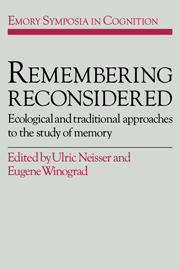Book contents
- Frontmatter
- Contents
- Preface
- List of contributors
- 1 New vistas in the study of memory
- 2 Continuities between ecological and laboratory approaches to memory
- 3 Memory for randomly sampled autobiographical events
- 4 Ordinary everyday memories: Some of the things of which selves are made
- 5 Walking in our own footsteps: Autobiographical memory and reconstruction
- 6 Memory observed and memory unobserved
- 7 The maintenance of marginal knowledge
- 8 The content and organization of autobiographical memories
- 9 The ontogeny of memory for real events
- 10 The functions of event memory: Some comments on Nelson and Barsalou
- 11 “The Wreck of the Old 97”: A real event remembered in song
- 12 Passive remembering
- 13 Remembering without experiencing: Memory for reported events
- 14 What is ordinary memory the memory of?
- 15 Go for the skill
- Name index
- Subject index
2 - Continuities between ecological and laboratory approaches to memory
Published online by Cambridge University Press: 25 March 2010
- Frontmatter
- Contents
- Preface
- List of contributors
- 1 New vistas in the study of memory
- 2 Continuities between ecological and laboratory approaches to memory
- 3 Memory for randomly sampled autobiographical events
- 4 Ordinary everyday memories: Some of the things of which selves are made
- 5 Walking in our own footsteps: Autobiographical memory and reconstruction
- 6 Memory observed and memory unobserved
- 7 The maintenance of marginal knowledge
- 8 The content and organization of autobiographical memories
- 9 The ontogeny of memory for real events
- 10 The functions of event memory: Some comments on Nelson and Barsalou
- 11 “The Wreck of the Old 97”: A real event remembered in song
- 12 Passive remembering
- 13 Remembering without experiencing: Memory for reported events
- 14 What is ordinary memory the memory of?
- 15 Go for the skill
- Name index
- Subject index
Summary
This conference on ecological and traditional approaches to memory was held in 1985, 100 years after the publication of Ebbinghaus's monograph (1885/1964) marking the beginnings of a science of memory. Although this happens to be a centennial coincidence rather than an observance, I want to emphasize some continuities between the tradition deriving from Ebbinghaus and more ecologically oriented research. There is a tendency to view the ecological approach to memory as contrasting sharply in both method and theory with the Ebbinghaus tradition. Indeed, some psychologists might see the research represented in this volume as exciting in direct proportion to the liberation it shows from the presumed dreariness and artificiality of the verbal learning tradition descending from Ebbinghaus. I argue here that this would be a mistake and, instead, suggest that there is much in common between laboratory studies of memory and the study of memory for events that did not occur in a psychology laboratory. Further, I believe that Ebbinghaus himself would have approved of most of what he would have heard at the conference.
Continuities across approaches
Verifiability
Ebbinghaus's most important methodological contribution to the scientific study of memory, in my opinion, is that he carefully controlled the conditions at encoding. In the Ebbinghaus tradition, the experimenter is present at the encoding and can therefore score for the accuracy of remembering later on. The problem of verifiability, as Brewer puts it, presents difficulties for the majority of studies of autobiographical memory.
- Type
- Chapter
- Information
- Remembering ReconsideredEcological and Traditional Approaches to the Study of Memory, pp. 11 - 20Publisher: Cambridge University PressPrint publication year: 1988
- 16
- Cited by

